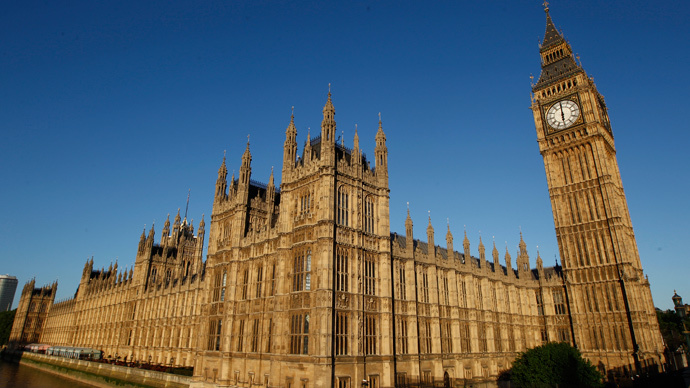Tories pledge devolution, EU referendum, but waver on British Bill of Rights in Queen's Speech

The Conservatives have announce a raft of new laws, including a new counter-terror bill, a consultation on a British Bill of Rights and pledged further devolution to the Scottish Parliament in the first meeting of the new government.
The Queen’s Speech, which acts as the focal point for the official State Opening of Parliament, took place before newly elected and returning Members of Parliament and peers in the House of Lords.
Cameron has previously said he would “not waste a single moment” delivering his manifesto pledges, many of which were vetoed by the Liberal Democrats during the 2010-2015 coalition administration.
Outgoing Lib Dem leader Nick Clegg said the new government was already abandoning the principles of liberalism his party had advocated over the past five years, while the Scottish National Party (SNP) said it will continue to use its influence to protest against further spending cuts.
READ MORE: Queen's Speech: Parliament officially opens LIVE UPDATES
Cameron faltered over the creation of a British Bill of Rights to replace the Human Rights Act (HRA), suggesting that the bill will be under consideration, rather than an outright law. The proposals have already caused cracks to form within the Conservative ranks, with some backbench MPs staging a rebellion.
The speech included a bill which will start the process for an EU membership referendum, likely to occur by 2017. The BBC reports that while the precise wording of the plebiscite question is as yet unknown, it is likely the “Yes” option will be to stay in the EU.
Further devolution powers for Scotland will be met with increased autonomy for English MPs voting on English matters. Some four of the 21 new measures introduced were about devolution and decentralization, showing the effects of the Scottish independence referendum last year, and the subsequent popularity of the SNP.
READ MORE: ‘Charm offensive’: Cameron tours Europe in bid to drive EU reform
"My government will bring forward legislation to secure a strong and lasting constitutional settlement, devolving wide-ranging powers to Scotland and Wales. Legislation will be taken forward giving effect to the Stormont House agreement in Northern Ireland"the Queen said.
Other measures include a new counter-extremism bill to help tackle radicalization and an increase in the level of free childcare provision for three and four year olds.
"Measures will also be brought forward to promote social cohesion and protect people by tackling extremism. New legislation will modernise the law on communications data, improve the law on policing and criminal justice, and ban the new generation of psychoactive drugs" she said.
Clegg said it was “dispiriting” to see how quickly the government was “tuning back on that liberal stance” achieved during the coalition.
“The human rights we hold dear, our right to privacy in an online age, our future as an open-minded, outward-looking country, are all hanging in the balance again because of the measures being announced by the Conservative government.”
He added that the party would “fight any attempt to weaken the fundamental rights of our citizens. “We will stand up for the poorest and the most vulnerable.”
SNP Westminster Group Leader Angus Robertson outlined the strength of his party and renewed its anti-austerity pledge ahead of the speech.
“The SNP group of 56 are already a strong and effective opposition to the Tory government,” he said. “That will be demonstrated further in our response to the UK government's Queen’s Speech.
“Our priority is ending austerity, and the damage it does to people’s lives. The Tory government’s priority is ending human rights, and we will work across party lines and with colleagues in the Scottish Parliament to stop them scrapping the Human Rights Act.”
He said the Scottish devolution negotiations will be the “first key test” for the new government.
To coincide with the Queen’s Speech, a number of high profile celebrities have come out in opposition to the Tory’s British Bill of Rights proposal.
Benedict Cumberbatch, David Harewood, Indira Varma, Vanessa Redgrave and Simon Callow have starred in short films based on experiences of people who have relied on the Human Rights Act.
Sherlock actor Cumberbatch said: “Our Human Rights Act belongs to all of us. It’s not for politicians to pick and choose when they apply or who deserves protection.
“Repealing it will mean less protection against state abuse or neglect, and weaken the rights of every single one of us - and the vulnerable most of all.”












